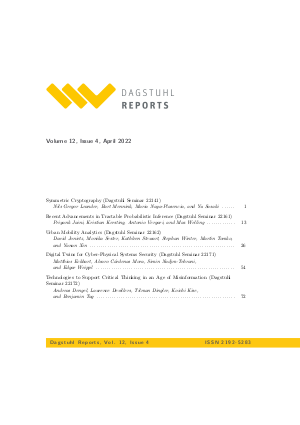Dagstuhl Reports, Volume 12, Issue 4
-
Part of:
Volume:
Dagstuhl Reports, Volume 12
Journal: Dagstuhl Reports (DagRep)

Event
- Dagstuhl Seminars 22141, 22161, 22162, 22171, 22172
Publication Details
- published at: 2022-11-14
- Publisher: Schloss Dagstuhl – Leibniz-Zentrum für Informatik
- DBLP: db/journals/dagstuhl-reports/dagstuhl-reports12
Access Numbers
- Detailed Access Statistics available here
-
Total Document Accesses (updated on a weekly basis):
0PDF Downloads
Documents
Dagstuhl Reports, Volume 12, Issue 4, April 2022, Complete Issue
Abstract
Cite as
Dagstuhl Reports, Volume 12, Issue 4, pp. 1-97, Schloss Dagstuhl – Leibniz-Zentrum für Informatik (2022)
Copy BibTex To Clipboard
@Article{DagRep.12.4,
title = {{Dagstuhl Reports, Volume 12, Issue 4, April 2022, Complete Issue}},
pages = {1--97},
journal = {Dagstuhl Reports},
ISSN = {2192-5283},
year = {2022},
volume = {12},
number = {4},
publisher = {Schloss Dagstuhl -- Leibniz-Zentrum f{\"u}r Informatik},
address = {Dagstuhl, Germany},
URL = {https://drops.dagstuhl.de/entities/document/10.4230/DagRep.12.4},
URN = {urn:nbn:de:0030-drops-172751},
doi = {10.4230/DagRep.12.4},
annote = {Keywords: Dagstuhl Reports, Volume 12, Issue 4, April 2022, Complete Issue}
}
Dagstuhl Reports, Table of Contents, Volume 12, Issue 4, 2022
Abstract
Cite as
Dagstuhl Reports, Volume 12, Issue 4, pp. i-ii, Schloss Dagstuhl – Leibniz-Zentrum für Informatik (2022)
Copy BibTex To Clipboard
@Article{DagRep.12.4.i,
title = {{Dagstuhl Reports, Table of Contents, Volume 12, Issue 4, 2022}},
pages = {i--ii},
journal = {Dagstuhl Reports},
ISSN = {2192-5283},
year = {2022},
volume = {12},
number = {4},
publisher = {Schloss Dagstuhl -- Leibniz-Zentrum f{\"u}r Informatik},
address = {Dagstuhl, Germany},
URL = {https://drops.dagstuhl.de/entities/document/10.4230/DagRep.12.4.i},
URN = {urn:nbn:de:0030-drops-172768},
doi = {10.4230/DagRep.12.4.i},
annote = {Keywords: Table of Contents, Frontmatter}
}
Symmetric Cryptography (Dagstuhl Seminar 22141)
Abstract
Cite as
Nils Gregor Leander, Bart Mennink, María Naya-Plasencia, Yu Sasaki, and Eran Lambooij. Symmetric Cryptography (Dagstuhl Seminar 22141). In Dagstuhl Reports, Volume 12, Issue 4, pp. 1-12, Schloss Dagstuhl – Leibniz-Zentrum für Informatik (2022)
Copy BibTex To Clipboard
@Article{leander_et_al:DagRep.12.4.1,
author = {Leander, Nils Gregor and Mennink, Bart and Naya-Plasencia, Mar{\'\i}a and Sasaki, Yu and Lambooij, Eran},
title = {{Symmetric Cryptography (Dagstuhl Seminar 22141)}},
pages = {1--12},
journal = {Dagstuhl Reports},
ISSN = {2192-5283},
year = {2022},
volume = {12},
number = {4},
editor = {Leander, Nils Gregor and Mennink, Bart and Naya-Plasencia, Mar{\'\i}a and Sasaki, Yu and Lambooij, Eran},
publisher = {Schloss Dagstuhl -- Leibniz-Zentrum f{\"u}r Informatik},
address = {Dagstuhl, Germany},
URL = {https://drops.dagstuhl.de/entities/document/10.4230/DagRep.12.4.1},
URN = {urn:nbn:de:0030-drops-172779},
doi = {10.4230/DagRep.12.4.1},
annote = {Keywords: block ciphers, cryptography, hash functions, stream cipers, symmetric cryptography}
}
Recent Advancements in Tractable Probabilistic Inference (Dagstuhl Seminar 22161)
Abstract
Cite as
Priyank Jaini, Kristian Kersting, Antonio Vergari, and Max Welling. Recent Advancements in Tractable Probabilistic Inference (Dagstuhl Seminar 22161). In Dagstuhl Reports, Volume 12, Issue 4, pp. 13-25, Schloss Dagstuhl – Leibniz-Zentrum für Informatik (2022)
Copy BibTex To Clipboard
@Article{jaini_et_al:DagRep.12.4.13,
author = {Jaini, Priyank and Kersting, Kristian and Vergari, Antonio and Welling, Max},
title = {{Recent Advancements in Tractable Probabilistic Inference (Dagstuhl Seminar 22161)}},
pages = {13--25},
journal = {Dagstuhl Reports},
ISSN = {2192-5283},
year = {2022},
volume = {12},
number = {4},
editor = {Jaini, Priyank and Kersting, Kristian and Vergari, Antonio and Welling, Max},
publisher = {Schloss Dagstuhl -- Leibniz-Zentrum f{\"u}r Informatik},
address = {Dagstuhl, Germany},
URL = {https://drops.dagstuhl.de/entities/document/10.4230/DagRep.12.4.13},
URN = {urn:nbn:de:0030-drops-172785},
doi = {10.4230/DagRep.12.4.13},
annote = {Keywords: approximate inference with guarantees, deep generative models, probabilistic circuits, Tractable inference}
}
Urban Mobility Analytics (Dagstuhl Seminar 22162)
Abstract
Cite as
David Jonietz, Monika Sester, Kathleen Stewart, Stephan Winter, Martin Tomko, and Yanan Xin. Urban Mobility Analytics (Dagstuhl Seminar 22162). In Dagstuhl Reports, Volume 12, Issue 4, pp. 26-53, Schloss Dagstuhl – Leibniz-Zentrum für Informatik (2022)
Copy BibTex To Clipboard
@Article{jonietz_et_al:DagRep.12.4.26,
author = {Jonietz, David and Sester, Monika and Stewart, Kathleen and Winter, Stephan and Tomko, Martin and Xin, Yanan},
title = {{Urban Mobility Analytics (Dagstuhl Seminar 22162)}},
pages = {26--53},
journal = {Dagstuhl Reports},
ISSN = {2192-5283},
year = {2022},
volume = {12},
number = {4},
editor = {Jonietz, David and Sester, Monika and Stewart, Kathleen and Winter, Stephan and Tomko, Martin and Xin, Yanan},
publisher = {Schloss Dagstuhl -- Leibniz-Zentrum f{\"u}r Informatik},
address = {Dagstuhl, Germany},
URL = {https://drops.dagstuhl.de/entities/document/10.4230/DagRep.12.4.26},
URN = {urn:nbn:de:0030-drops-172792},
doi = {10.4230/DagRep.12.4.26},
annote = {Keywords: data analytics, Deep learning, Reproducible research, urban mobility}
}
Digital Twins for Cyber-Physical Systems Security (Dagstuhl Seminar 22171)
Abstract
Cite as
Alvaro Cárdenas Mora, Simin Nadjm-Tehrani, Edgar Weippl, and Matthias Eckhart. Digital Twins for Cyber-Physical Systems Security (Dagstuhl Seminar 22171). In Dagstuhl Reports, Volume 12, Issue 4, pp. 54-71, Schloss Dagstuhl – Leibniz-Zentrum für Informatik (2022)
Copy BibTex To Clipboard
@Article{mora_et_al:DagRep.12.4.54,
author = {Mora, Alvaro C\'{a}rdenas and Nadjm-Tehrani, Simin and Weippl, Edgar and Eckhart, Matthias},
title = {{Digital Twins for Cyber-Physical Systems Security (Dagstuhl Seminar 22171)}},
pages = {54--71},
journal = {Dagstuhl Reports},
ISSN = {2192-5283},
year = {2022},
volume = {12},
number = {4},
editor = {Mora, Alvaro C\'{a}rdenas and Nadjm-Tehrani, Simin and Weippl, Edgar and Eckhart, Matthias},
publisher = {Schloss Dagstuhl -- Leibniz-Zentrum f{\"u}r Informatik},
address = {Dagstuhl, Germany},
URL = {https://drops.dagstuhl.de/entities/document/10.4230/DagRep.12.4.54},
URN = {urn:nbn:de:0030-drops-172805},
doi = {10.4230/DagRep.12.4.54},
annote = {Keywords: cyber-physical systems, digital twins, information security, production systems engineering, SCADA, industrial control systems, Industry 4.0}
}
Technologies to Support Critical Thinking in an Age of Misinformation (Dagstuhl Seminar 22172)
Abstract
Cite as
Tilman Dingler, Benjamin Tag, and Andrew Vargo. Technologies to Support Critical Thinking in an Age of Misinformation (Dagstuhl Seminar 22172). In Dagstuhl Reports, Volume 12, Issue 4, pp. 72-95, Schloss Dagstuhl – Leibniz-Zentrum für Informatik (2022)
Copy BibTex To Clipboard
@Article{dingler_et_al:DagRep.12.4.72,
author = {Dingler, Tilman and Tag, Benjamin and Vargo, Andrew},
title = {{Technologies to Support Critical Thinking in an Age of Misinformation (Dagstuhl Seminar 22172)}},
pages = {72--95},
journal = {Dagstuhl Reports},
ISSN = {2192-5283},
year = {2022},
volume = {12},
number = {4},
editor = {Dingler, Tilman and Tag, Benjamin and Vargo, Andrew},
publisher = {Schloss Dagstuhl -- Leibniz-Zentrum f{\"u}r Informatik},
address = {Dagstuhl, Germany},
URL = {https://drops.dagstuhl.de/entities/document/10.4230/DagRep.12.4.72},
URN = {urn:nbn:de:0030-drops-172815},
doi = {10.4230/DagRep.12.4.72},
annote = {Keywords: Cognitive Security, Misinformation, Bias Computing}
}